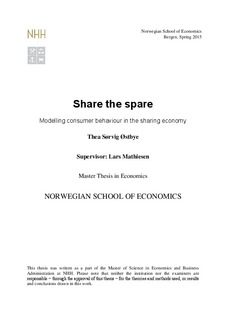Share the spare : modelling consumer behaviour in the sharing economy
Master thesis
Permanent lenke
http://hdl.handle.net/11250/300886Utgivelsesdato
2015Metadata
Vis full innførselSamlinger
- Master Thesis [4372]
Sammendrag
The sharing economy allows consumers to share spare goods and resources through online platforms, using technology to reduce the transaction costs and efficiently match supply with demand on a global scale. Reflecting a change in consumption patterns, the sharing economy is disrupting existing industries, steadily replacing ownership with access.
To explain observed consumer behaviour in the sharing economy, we develop an economic model that describes consumers’ choice of providing and receiving access to underutilised goods. The model is applied to the market for ridesharing, where owners with empty seats are connected with passengers looking for a ride.
Modelling the purchase decision, we find that the number of consumers who purchase a car increases when 1) the price of sharing increases, 2) the price of owning decreases, 3) the owner’s transaction cost decreases and 4) the passenger’s transaction cost increases. On the supply side, the number of consumers offering a lift in their car to others increases when 1) the revenue generated from sharing increases, 2) the owner’s transaction cost decreases and 3) the passenger’s transaction cost increases. On the demand side, the number of consumers riding with others increases when 1) the price of sharing decreases, 2) the owner’s transaction cost increases and 3) the passenger’s transaction cost decreases.
